Is this not what you were looking for? Switch to the current version or choose one from the drop-down menu.
4 Windows agent installation from MSI
Overview
Zabbix Windows agent can be installed from Windows MSI installer packages (32-bit or 64-bit) available for download.
A 32-bit package cannot be installed on a 64-bit Windows.
All packages come with TLS support, however, configuring TLS is optional.
Both UI and command-line based installation is supported.
Although Zabbix installation from MSI installer packages is fully supported, it is recommended to install at least Microsoft .NET Framework 2 for proper error handling. See Microsoft Download .NET Framework.
Installation steps
To install, double-click the downloaded MSI file.
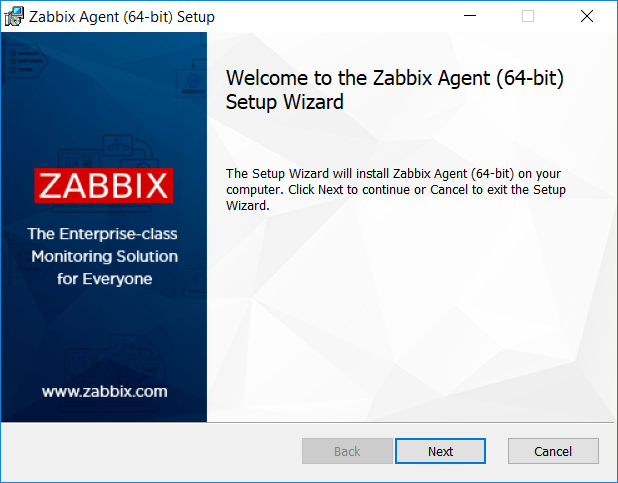
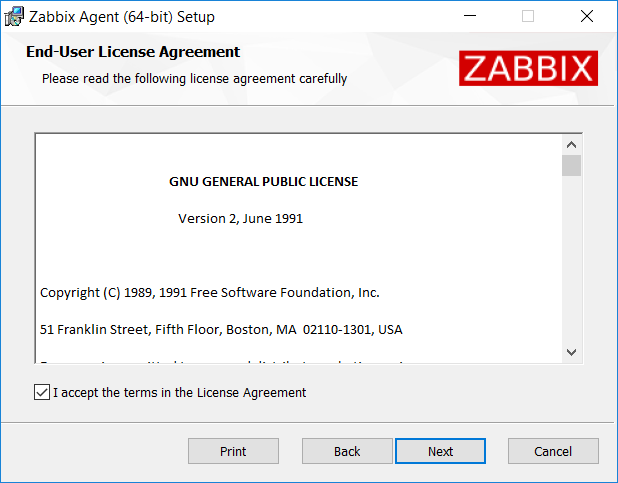
Accept the license to proceed to the next step.
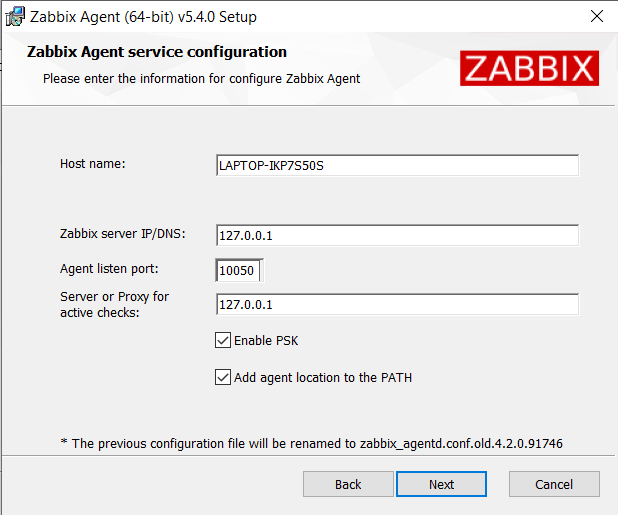
Specify the following parameters.
| Parameter | Description |
|---|---|
| Host name | Specify host name. |
| Zabbix server IP/DNS | Specify IP/DNS of Zabbix server. |
| Agent listen port | Specify agent listen port (10050 by default). |
| Server or Proxy for active checks | Specify IP/DNS of Zabbix server/proxy for active agent checks. |
| Enable PSK | Mark the checkbox to enable TLS support via pre-shared keys. |
| Add agent location to the PATH | Add agent location to the PATH variable. |
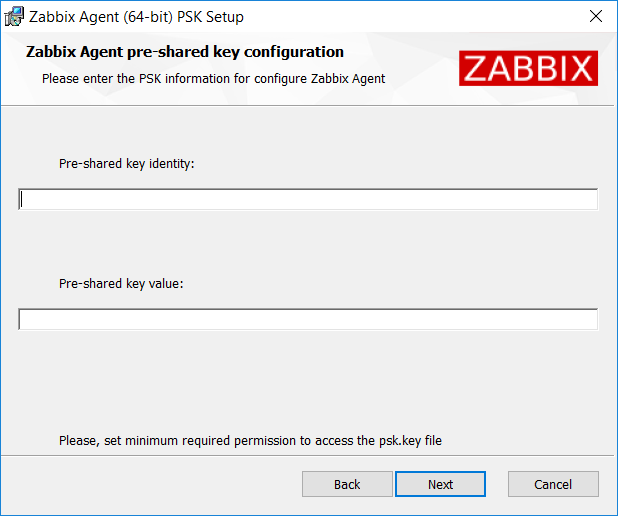
Enter pre-shared key identity and value. This step is only available if you checked Enable PSK in the previous step.
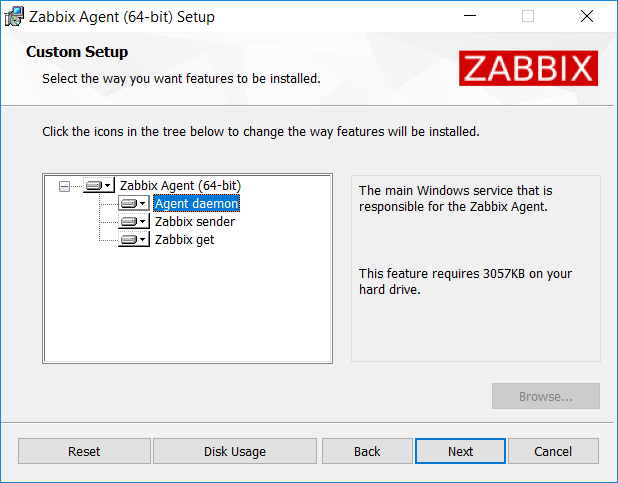
Select Zabbix components to install - Zabbix agent daemon, Zabbix sender, Zabbix get.
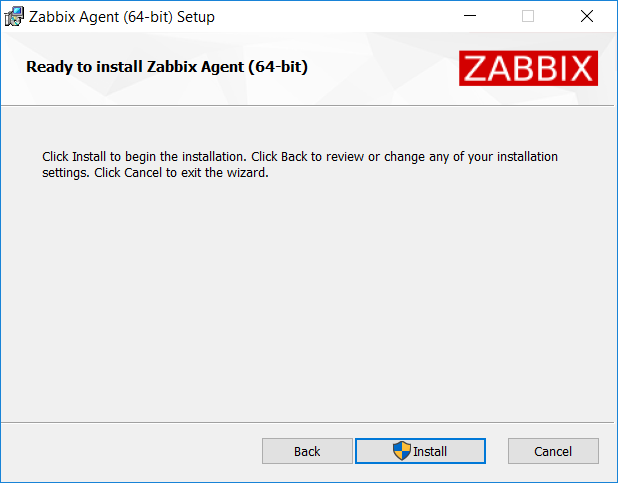
Zabbix components along with the configuration file will be installed in a Zabbix Agent folder in Program Files. zabbix_agentd.exe will be set up as Windows service with automatic startup.
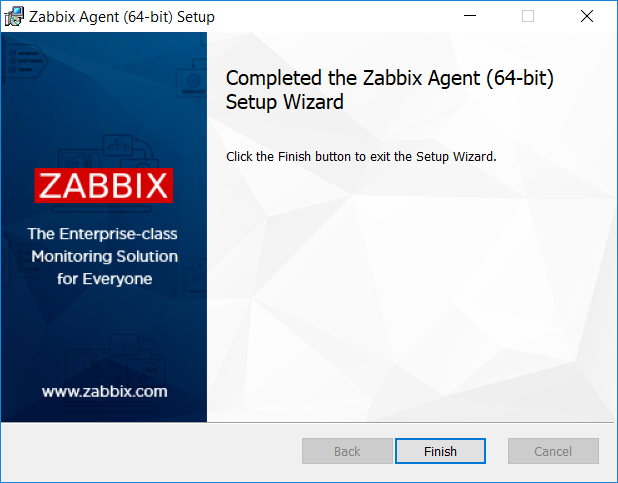
Command-line based installation
Supported parameters
The following parameters are supported by created MSIs.
| Parameter | Description |
|---|---|
| ADDDEFAULT | A comma-delimited list of programs to install. Possible values: AgentProgram, GetProgram, SenderProgram, ALL.Example: ADDDEFAULT=AgentProgram,GetProgram |
| ADDLOCAL | A comma-delimited list of programs to install. Possible values: AgentProgram, GetProgram, SenderProgram, ALL.Example: ADDLOCAL=AgentProgram,SenderProgram |
| ALLOWDENYKEY | Sequence of "AllowKey" and "DenyKey" parameters separated by ;Use \\; to escape the delimiter. |
| CONF | The full pathname to a custom configuration file. Example: CONF=c:\full\path\to\user.conf |
| ENABLEPATH | Add agent location to the PATH variable. |
| ENABLEPERSISTENTBUFFER | Zabbix agent 2 only. Enable the usage of local persistent storage for active items. |
| HOSTINTERFACE | An optional parameter that defines the host interface. |
| HOSTMETADATA | An optional parameter that defines the host metadata. |
| HOSTMETADATAITEM | An optional parameter that defines a Zabbix agent item used for getting the host metadata. |
| HOSTNAME | An optional parameter that defines the hostname. |
| INCLUDE | Sequence of includes separated by ; |
| INSTALLFOLDER | The full pathname of the folder in which Zabbix components along with the configuration file will be installed. |
| LISTENIP | A list of comma-delimited IP addresses that the agent should listen on. |
| LISTENPORT | The agent will listen on this port for connections from the server. |
| LOGFILE | The name of the log file. |
| LOGTYPE | The type of the log output. |
| PERSISTENTBUFFERFILE | Zabbix agent 2 only. The file where Zabbix agent 2 should keep the SQLite database. |
| PERSISTENTBUFFERPERIOD | Zabbix agent 2 only. The time period for which data should be stored when there is no connection to the server or proxy. |
| SERVER | A list of comma-delimited IP addresses, optionally in CIDR notation, or hostnames of Zabbix servers and Zabbix proxies. |
| SERVERACTIVE | The Zabbix server/proxy address or cluster configuration to get active checks from. |
| SKIP | SKIP=fw - do not install the firewall exception rule. |
| STATUSPORT | Zabbix agent 2 only. If set, the agent will listen on this port for HTTP status requests (http://localhost:<port>/status). |
| TIMEOUT | Spend no more than Timeout seconds on processing. |
| TLSACCEPT | What incoming connections to accept. |
| TLSCAFILE | The full pathname of a file containing the top-level CA(s) certificates for peer certificate verification, used for encrypted communications between Zabbix components. |
| TLSCERTFILE | The full pathname of a file containing the agent certificate or certificate chain, used for encrypted communications between Zabbix components. |
| TLSCONNECT | How the agent should connect to Zabbix server or proxy. |
| TLSCRLFILE | The full pathname of a file containing revoked certificates. This parameter is used for encrypted communications between Zabbix components. |
| TLSKEYFILE | The full pathname of a file containing the agent private key, used for encrypted communications between Zabbix components. |
| TLSPSKFILE | The full pathname of a file containing the agent pre-shared key, used for encrypted communications with Zabbix server. |
| TLSPSKIDENTITY | The pre-shared key identity string, used for encrypted communications with Zabbix server. |
| TLSPSKVALUE | The pre-shared key string value, used for encrypted communications with Zabbix server. |
| TLSSERVERCERTISSUER | The allowed server (proxy) certificate issuer. |
| TLSSERVERCERTSUBJECT | The allowed server (proxy) certificate subject. |
Examples
To install Zabbix Windows agent from the command-line, you may run, for example:
SET INSTALLFOLDER=C:\Program Files\Zabbix Agent
msiexec /l*v log.txt /i zabbix_agent-6.4.0-x86.msi /qn^
LOGTYPE=file^
LOGFILE="%INSTALLFOLDER%\zabbix_agentd.log"^
SERVER=192.168.6.76^
LISTENPORT=12345^
SERVERACTIVE=::1^
HOSTNAME=myHost^
TLSCONNECT=psk^
TLSACCEPT=psk^
TLSPSKIDENTITY=MyPSKID^
TLSPSKFILE="%INSTALLFOLDER%\mykey.psk"^
TLSCAFILE="c:\temp\f.txt1"^
TLSCRLFILE="c:\temp\f.txt2"^
TLSSERVERCERTISSUER="My CA"^
TLSSERVERCERTSUBJECT="My Cert"^
TLSCERTFILE="c:\temp\f.txt5"^
TLSKEYFILE="c:\temp\f.txt6"^
ENABLEPATH=1^
INSTALLFOLDER="%INSTALLFOLDER%"^
SKIP=fw^
ALLOWDENYKEY="DenyKey=vfs.file.contents[/etc/passwd]"You may also run, for example:
msiexec /l*v log.txt /i zabbix_agent-6.4.0-x86.msi /qn^
SERVER=192.168.6.76^
TLSCONNECT=psk^
TLSACCEPT=psk^
TLSPSKIDENTITY=MyPSKID^
TLSPSKVALUE=1f87b595725ac58dd977beef14b97461a7c1045b9a1c963065002c5473194952If both TLSPSKFILE and TLSPSKVALUE are passed, then TLSPSKVALUE will be written to TLSPSKFILE.

